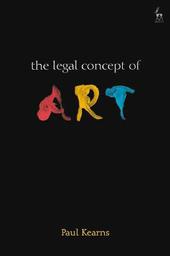
|
The Legal Concept of Art
Hardback
Main Details
| Title |
The Legal Concept of Art
|
| Authors and Contributors |
By (author) Paul Kearns
|
| Physical Properties |
| Format:Hardback | | Pages:304 | | Dimensions(mm): Height 234,Width 156 |
|
| Category/Genre | Theory of art |
|---|
| ISBN/Barcode |
9781901362503
|
| Classifications | Dewey:344.097 |
|---|
| Audience | | Undergraduate | | Postgraduate, Research & Scholarly | | Professional & Vocational | |
|---|
|
Publishing Details |
| Publisher |
Bloomsbury Publishing PLC
|
| Imprint |
Hart Publishing
|
| Publication Date |
1 September 1998 |
| Publication Country |
United Kingdom
|
Description
This analysis of the regulation of art by law has both practical and jurisprudential implications. It examines the treatment of art within seven distinct traditional legal subjects, namely obscenity law, copyright law, libel law, the public funding of art, the law of charitable trusts, customs law and the law on the movement of national treasures, identifying in each the specialized problems law faces, not least given the lack of a universally acceptable definition of art. Based primarily on English law, the text also has a comparative dimension including French, American and European Union law. In this way a unitary idea of how law tackles its operation is achieved. This book should be of use to collectors, curators, art traders and lawyers.
Author Biography
Paul Kearns is a Lecturer in Law at Manchester University.
ReviewsThe book under review is a first. It addresses the relationship between the law of three jurisdictions (England, France and the USA) and art (including literature) and inaugurates a doctrinal and theoretical field which has been neglected in English Scholarship... Its main achievement lies in bringing together disparate areas of law dealing with art, and in suggesting that the concept of art should acquire juristic value and lead to doctrinal modifications in civil and criminal law... Offering a cogent argument for turning art into such a concept, which would cut across substantive classifications and procedural distinctions, is an important contribution to scholarship and policy. -- Costas Douzinas * Legal Studies *
|